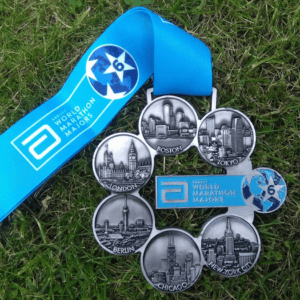UAMS’ Yulian Menyaev, Ph.D., Completes Six of the World’s Toughest Marathons to Win Abbott World Marathon Majors Medal
| Yulian Menyaev, Ph.D., keeps a low profile as a research associate in the University of Arkansas for Medical Sciences (UAMS) Department of Otolaryngology – Head and Neck Surgery, quietly helping researchers conduct clinical trials on potentially life-saving therapies.
Outside UAMS, Menyaev is known as one of the world’s elite marathon runners. He recently completed six of the world’s toughest marathons to win the Abbott World Marathon Majors Medal.
After finishing the Chicago, New York, Boston, Tokyo and Berlin marathons, the day finally came on April 21, when he crossed the finish line at the London Marathon — his sixth and final long-distance race to claim the coveted six-star medal won by only three other Arkansans.
“I did it, finally. I did it,” Menyaev thought after the long-awaited moment. “It was very emotional. It’s still very emotional for me to wear this medal.”
The six marathons cover a total distance of 157.2 miles, though Menyaev estimates he’s logged more than 2,500 miles (about the distance from Little Rock to Juneau, Alaska) over the last 12 years in training. In total, he completed 62 marathons, including ultra-marathons.
“It’s the most difficult medal to achieve for runners. It took me several years of struggle,” he said. “Unlike all other marathons in the world, these six are considered elite because you can’t just sign up for them. You have to qualify and be invited to run each of these marathons.”
As a mountaineer in his native Russia, Menyaev excelled in physical endurance tests, climbing the Caucasus Mountains, including Elbrus, the highest mountain in Europe. “It is almost as physically demanding as running a marathon, so after crossing the finish line of each marathon, I feel as if I have just conquered another difficult mountain.
“When I came to the U.S. in 2012 to do laser research at UAMS, I noticed that here almost everywhere in many cities people are running,” he said. “In Russia at that time, running was not widespread. I saw an article in one of the magazines about the Little Rock Marathon. At the time, it seemed to me like only Olympic gods could run marathons.”
 Menyeav began seriously training for the Little Rock Marathon by running through the streets of Little Rock, sometimes as early as 4 a.m. and as late as 11 p.m.
Menyeav began seriously training for the Little Rock Marathon by running through the streets of Little Rock, sometimes as early as 4 a.m. and as late as 11 p.m.
“After analyzing the finish results of my first 10K race, I discovered that I had overtaken 92% of the participants in this race. A year later, I ran my first Little Rock Marathon. The next year, I was accepted into the Little Rock Marathon Pace Team.”
A pacer is an experienced marathon runner who leads a team of novice marathon runners from start to finish at a strictly set pace.
To be a successful marathoner, Menyaev followed a strict regimen and paid close attention to the characteristics of each event.
“Running a marathon is very close to playing chess. You need to know in advance, plan the game combination and then strictly follow it.”
When asked why he runs, Menyaev is not as sure. “I really don’t know. To be alone where it’s quiet,” he said. “You are only running. You have to have passion for this. It’s my sport.”
Menyaev has learned how to push past obstacles to achieve his top running status. “I have the knee of an old guy,” he says. “I run with a certain amount of discomfort.”
That discomfort helps him relate to patients at UAMS. “I want to do something to help them, so I am very happy to give my 30th whole blood donation. I don’t know how to explain it, but there is a correlation between the fact that I am a cancer researcher and a marathon runner.”
Due to a serious knee injury, he foresees a time in the not-too-distant future when he will stop running long distance races. If all goes as planned, he has one more marathon in him — the 2025 World Marathon Majors anniversary race.
“Wherever this seventh elite marathon is, I will have to run it. I have learned that gradually, I can achieve everything I want in my life.”
